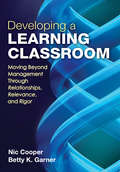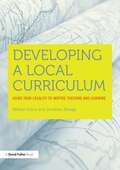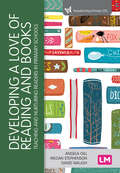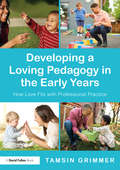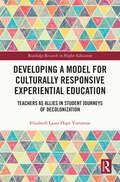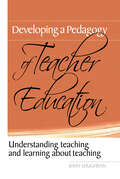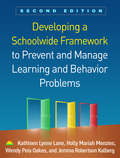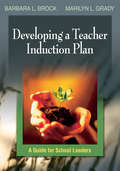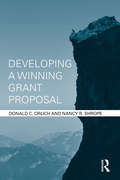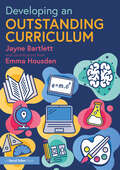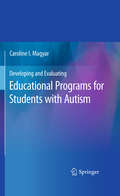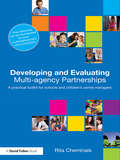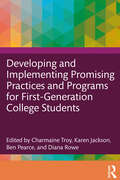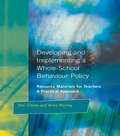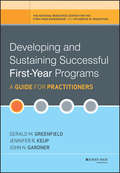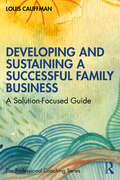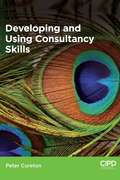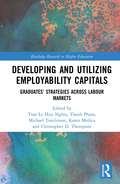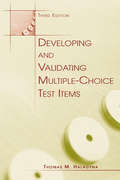- Table View
- List View
Developing a Learning Classroom: Moving Beyond Management Through Relationships, Relevance, and Rigor
by Ned A. Cooper Betty K. GarnerDiscover powerful ways to connect with your students!All too often, managing a classroom means gaining control, dictating guidelines, and implementing rules. Designed for any teacher struggling with student behavior, motivation, and engagement, Developing a Learning Classroom explores how to create a thriving, learning-centered classroom through three critical concepts?relationships, relevance, and rigor. Discover how you can:Develop an interactive learning mindsetCreate a safe environment where students question, explore, and discover Uncover a student′s learning profile as well as your own teaching styleUse student input to create classroom practices and procedures Apply brain-based instructional strategies to keep students engagedUse student surveys and a personal education plan to improve learning environmentsFilled with classroom stories, starter worksheets, and action steps, this book reveals the secrets to transforming an ordinary classroom into an extraordinary learning community!
Developing a Local Curriculum: Using your locality to inspire teaching and learning
by Jonathan Savage William EvansHow can your local area become a source of inspiration for curriculum development? How can it enhance the teaching and learning at your school? Developing a Local Curriculum explores how your local area and its resources can be used as a stimulus and inspiration for curriculum development. It examines the ways in which the geography, history, culture and people within your local area can enrich the learning experiences offered to students to make them more relevant and meaningful. Drawing on a wide range of examples from schools already taking this approach, the book shows show how the rich histories and cultures of individual subjects can be developed through an understanding of the local area. It also reveals how engaging with the 'local' in education can help restore young people's sense of identity and community. Features include: · practical guidance on engaging with the local community in innovative ways · suggestions for local cultural activities such as architecture, digital arts, theatre and film · ways to develop effective partnerships with local businesses and charities · detailed case studies showing how schools put the ideas described into practice This exciting new book aims to inspire you to develop a curriculum that is meaningful for pupils and gives them a strong sense of connection with their local area and understanding of its past, future and present.
Developing a Love of Reading and Books: Teaching and nurturing readers in primary schools (Transforming Primary QTS Series)
by David Waugh Angela Gill Megan Stephensonnursing children read for pleasure and develop a life-long love of reading is a priority for all primary school teachers. The National Curriculum focuses heavily on promoting reading for pleasure and engaging pupils using a range of diverse and inclusive texts and materials. This text supports trainee teachers working towards primary QTS and Early Career Teachers to understand the importance of supporting children to become readers, enjoy reading for pleasure and develop higher level reading skills. It includes guidance, case studies and theoretical perspectives to show trainee teachers how they can develop children’s reading.
Developing a Loving Pedagogy in the Early Years: How Love Fits with Professional Practice
by Tamsin GrimmerCare and caring are key to early childhood education and yet love can be viewed as a taboo word within early childhood settings. This book guides practitioners through the potentially problematic area of loving the children they care for. It shows where a loving pedagogy can fit within professional practice and how this can enrich experiences for children and educators. The book explores how educators can support their children by holding them in mind, valuing them and promoting their best interests. Focusing on how relationships, attachment and connections underpin our settings and practice, the chapters cover: the fundamentals of professional love appropriate touch in practice the different ways in which children feel loved the rights of the child empowering children through love working with parents and carers. Including case studies and questions for reflection, this is vital reading for practitioners wanting to develop a nurturing and loving pedagogy that places the child at the centre of their practice.
Developing a Model for Culturally Responsive Experiential Education: Teachers as Allies in Student Journeys of Decolonization (Routledge Research in Higher Education)
by Elizabeth Laura YomantasThis book provides a new, empirically informed framework designed to equip higher education faculty with the tools to help students engage in humanizing, mutually beneficial, and anti-colonial experiential education alongside other students and communities around the world. The author maps the conceptual development of culturally responsive experiential education (CREE) as a novel framework, situated at the nexus of culturally responsive research methodologies, the Indigenous research paradigm, critical service learning, and critical pedagogy in experiential education. The chapters detail qualitative research findings from an undergraduate CREE program in rural Fiji to illustrate the implementation of the novel CREE framework and discuss post-program possibilities based on the research study findings. Situated in narrative inquiry, the book also includes interspersed participant vignettes in order to center student voices and illuminate the research study findings. With attention to themes including emergent critical consciousness, critical allyship, and personal journeys of decolonization as experienced through the CREE framework, it will be of benefit to both education scholars and higher education faculty interested in experiential education and culturally responsive pedagogies.
Developing a Pedagogy of Teacher Education: Understanding Teaching & Learning about Teaching
by John LoughranA pedagogy of teacher education must go well beyond the simple delivery of information about teaching. This book describes and explores the complex nature of teaching and of learning about teaching, illustrating how important teacher educators' professional knowledge is and how that knowledge must influence teacher training practices. The book is divided into two sections. The first considers the crucial distinction between teaching student-teachers and teaching them about teaching, allowing practice to push beyond the technical-rational, or tips-and-tricks approach, to teaching about teaching in a way that brings in the appropriate attitudes, knowledge and skills of teaching itself. Section two highlights the dual nature of student teachers’ learning, arguing that they need to concentrate not only on learning what is being taught but also on the way in which that teaching is conducted.
Developing a School Finance System for Ka-12 Reform in Qatar
by Louay Constant Jeffery C. Tanner Titus Galama Gabriella C. Gonzalez Cassandra M. GuarinoReform-minded leaders of Qatar, who have embarked on a sweeping reform of their nation's education system, asked RAND to evaluate their education finance system and offer suggestions for improvements. The authors analyze the system's evolution and resource allocation patterns between 2004 and 2006 and develop analytic tools for performing the evaluation, including a framework that allows assessment of the system in light of six main objectives.
Developing a Schoolwide Framework to Prevent and Manage Learning and Behavior Problems, Second Edition
by Kathleen Lynne Lane Holly Mariah Menzies Wendy Peia Oakes Jemma Robertson KalbergNow revised and expanded, this volume explains how to design, implement, and evaluate a comprehensive, integrated, three-tiered (Ci3T) model of prevention. Rather than presenting a packaged program, the book provides resources and strategies for designing and tailoring Ci3T to the needs and priorities of a particular school or district community. Ci3T is unique in integrating behavioral, academic, and social–emotional components into a single research-based framework. User-friendly features include tools for collecting and using student and schoolwide data; guidance for selecting effective interventions at each tier; detailed case examples; and tips for enhancing collaboration between general and special educators, other school personnel, and parents. In a convenient large-size format, the volume includes several reproducible forms that can be downloaded and printed for repeated use. Prior edition title: Developing Schoolwide Programs to Prevent and Manage Problem Behaviors. New to This Edition *Updated step-by-step approach reflecting the ongoing development of Ci3T. *Chapter on evidence for the effectiveness of tiered models. *Chapter on low-intensity, teacher-delivered strategies. *Chapter on sustaining effective implementation and professional development. *"Lessons Learned" feature--reflections and examples from educators in a range of settings.
Developing a Servant's Heart: Become Fully Like Christ by Serving Others (Charles F. Stanley Bible Study Series)
by Charles F. StanleyHow to serve with generosity and love.Service is giving, and giving is the very essence of the gospel. God gave His only begotten Son. Jesus gave His life on the cross. The Holy Spirit gives us the power to resist sin and follow God's commands. It is from this abundance of what we have been given that God calls us to freely give ourselves—to actually develop a mindset in which we look first to the needs of others above our own interests.In Developing a Servant's Heart, Dr. Charles Stanley shows how each of us have been equipped, empowered, and charged to do this as we follow the example of Jesus—the Supreme Servant.With over 1 million copies sold, the Charles F. Stanley Bible Study Series is a unique approach to Bible study, incorporating biblical truth, personal insights, emotional responses, and a call to action.Each study draws on Dr. Stanley&’s many years of teaching the guiding principles found in God&’s Word, showing how we can apply them in practical ways to every situation we face. This edition of the series has been completely revised and updated, and includes two brand-new lessons from Dr. Stanley.Each of the twelve lessons includes:Overview: A brief look at what is covered in the lessonLife's Questions: A teaching from Dr. Stanley that unpacks the topic of the lessonLiving the Principle: Application and Bible study questions based on the key pointsReflection: Key takeaways to put into practice today and tomorrow
Developing a Talent for Science
by Ritsert C. JansenWant to make the most of your talent for science? This practical guide for students, postdoctorates and professors offers a unique stepwise approach to help you develop your expertise and become a more productive scientist. Covering topics from giving presentations and writing effectively to prioritising your workload, it provides guidance to enhance your skills and combine them with those of others to your mutual benefit. Learn how to maintain your passion for science, inspire others to develop their abilities and motivate yourself to plan effectively, focus on your goals and even optimise funding opportunities. With numerous valuable tips, real-life stories, novel questionnaires and exercises for self-reflection, this must-read guide provides everything you need to take responsibility for your own personal and professional development.
Developing a Teacher Induction Plan: A Guide for School Leaders
by Dr Marilyn L. Grady Dr Barbara L. BrockTo combat the growing challenge of teacher attrition, induction experts Brock and Grady offer a multiyear, step-by-step induction program for retaining and developing beginning teachers.
Developing a Winning Grant Proposal
by Donald C. Orlich Nancy R. ShropeIn a world of tightening budgets and increased competition for grant money, Developing a Winning Grant Proposal provides the guidelines, strategies, plans, and techniques to craft a fundable grant proposal. A user-friendly, engaging, and up-to-date guide, this book covers the entire process from the inception of a good idea, to the formulation of a strong proposal, to the next steps once a proposal is funded. Providing a basic overview and helpful tools for busy faculty and researchers, this is a must-have guide for anyone interested in the mechanisms that successful grant writers employ. Special Features Include: Appendices with a "Model of a Funded Proposal" and a "Basic Toolbox for Grant Seekers" Checklists for self-evaluating the efficacy of each portion of the grant proposal Coverage of complex issues in a concise and clear manner, perfect for grant writers facing tight time constraints.
Developing an Outstanding Curriculum (Becoming an Outstanding Teacher)
by Jayne Bartlett Emma HousdenOur role as educators is to develop a curriculum which facilitates outstanding learning and which builds social, cultural and educational capital. The curriculum is much more than a content driven document, it is the vehicle for educational change. This book compliments the Make it Outstanding Series and is central to subject development. It has a strong focus on combining curriculum theory and translating this to a practical approach schools can adapt and implement with ease. Packed full of practical strategies and examples to facilitate curriculum conversations within subject and senior leadership teams the chapters provide a considered balance between theory and application. Supporting teachers, curriculum leaders, senior leaders and headteachers in leading and implementing the curriculum within their schools, the book covers: An overview of different curriculum models How to develop the curriculum intent from the whole school vision Developing the composite and component structure How we implement the curriculum with a focus on learning episodes How we assess the curriculum Social, cultural and educational capital How we quality assure the curriculum Developing an Outstanding Curriculum is an essential read for all teachers, curriculum leaders, senior leaders, and headteachers who want to ensure that they drive the development of an outstanding curriculum.
Developing and Branding the Fashion Merchandising Portfolio
by Phyllis Borcherding Janace E. BuboniaA career in fashion merchandising means working in a fast-paced, creative industry-and a highly competitive one. Developing and Branding the Fashion Merchandising Portfolio is a guide to creating a portfolio and brand for yourself that will stand out. <p><p>Portfolios provide immediate visual evidence of what you can do, and they communicate hands-on experience more explicitly than a résumé can on its own. Whether you're interested in design, product development, buying, textile design, or trend forecasting, this book provides activities to help you identify and focus your skills. <p><p>Step-by-step instructions demonstrate how to gather examples of your work, how to choose a design and layout, and ways to incorporate drawings, sketches, and CAD-generated material into a consistent, streamlined portfolio that reflects your personality. User friendly and above all visual, this is the guide for creating a portfolio that will get you hired-and keep your career on track.
Developing and Evaluating Educational Programs for Students with Autism
by Caroline I. MagyarRecent years have witnessed a marked increase both in the number of children diagnosed with autism spectrum disorders (ASDs) and those placed alongside their typically developing peers in general education classrooms. These events bring with them a plethora of challenges, particularly in the areas of program design and educational practices. Developing and Evaluating Educational Programs for Students with Autism offers systematic, evidence-based guidelines--as well as tools, checklists, and other resources--for creating effective learning environments for students across the autism spectrum and the grade span. Planning, development, implementation, and continuous evaluation are examined in detail in this practical volume, which features: An overview of the ASDs, with an emphasis on effective educational practice.In-depth discussion of the ASD Program Development and Evaluation Protocol.A staff training model for personnel working with students with ASD.A detailed framework for student support teams and family-school collaboration.Specific guidelines for conducting needs assessments and student evaluations.* Case examples of applications of the protocol on the program, school, and regional levels. Developing and Evaluating Educational Programs for Students with Autism is a uniquely rigorous and thorough reference benefiting school psychologists and special education professionals as well as those in allied educational and mental health fields, including clinical child, school, and developmental psychologists, psychiatrists, and other professionals working with children with autism.
Developing and Evaluating Multi-Agency Partnerships: A Practical Toolkit for Schools and Children's Centre Managers
by Rita CheminaisIn recent years government initiatives such as Sure Start, Extended Schools and Every Child Matters have been significant in the promotion of an agenda to create collaborative working environments and introduce multi-agency practice into a range of child-centred settings. Developing and Evaluating Multi-Agency Partnerships provides advice and guidance for managers and leaders responsible for overseeing multi-agency working in these settings, providing a self-evaluation framework to help improve the quality and effectiveness of multi-agency relationships. The valuable tools and templates within this book will: Explain the importance of self-evaluation Provide a framework for self-evaluation via a step by step guide Link multi-agency practice with improving the Every Child Matters outcomes Suggest best practice for gathering multi-agency evidence Give guidance on building a portfolio of evidence and achieving external recognition The self-evaluation framework provided in this book meets the requirements of the Children’s Workforce standards and OFSTED requirements for effective partnerships. A highly practical handbook, this book is essential reading for all those who are implementing or improving a multi-agency partnership in their setting. To improve the effectiveness of this resource, additional resources are downloadable in customisable form from http://www.routledgeteachers.com/resources/fulton
Developing and Implementing Promising Practices and Programs for First-Generation College Students
by Charmaine Troy, Karen Jackson, Ben Pearce, and Diana RoweAs first-generation students gain greater access to higher education, faculty, and staff at colleges and universities must provide intentional engagement that supports their persistence and graduation. This book serves as a guidebook for higher education practitioners seeking to implement or enhance first-generation programming at their institutions. The chapters provide detailed descriptions of the development, implementation, and assessment of programs and practices intended to support the success of first-generation college students. Authors share insights on building allies, identifying and working through challenges, and applicable takeaways for implementing similar practices and programs at the reader’s own institutions. Programming discussed in the book ranges in funding levels and includes activities such as faculty dinners, study abroad, bridge programs, living learning communities, peer mentoring, intrusive advising, and holistic well-being. This valuable resource helps higher education practitioners better support and position first-generation students for success.
Developing and Implementing a Whole-School Behavior Policy: A Practical Approach
by Anne Murray Don ClarkeFirst Published in 1997. Routledge is an imprint of Taylor & Francis, an informa company.
Developing and Presenting a Professional Portfolio in Early Childhood Education
by Janese Daniels Nancy W. Wiltz Heather Skelley Hannah S. Cawley Ocie Watson-ThompsonThis book is a must-have handbook for all early childhood education major preparing their professional portfolio for scholarly review and job placement. In ten straightforward and user-friendly chapters, Wiltz et. al.'s supplemental textbook instructs the student on what items to collect for the portfolio, how to compile/construct/label it, and then how to talk about it/present it. <p><p> Readers will journey from learning the reasons behind developing a professional portfolio clear through completion of a final product. The authors present the topic to readers via a successful step-by-step process of developing, self-evaluating, and presenting a professional early childhood education portfolio. <p><p> Each chapter has a definitive goal and will guide the reader that much closer to the end goal-that of a portfolio ready to present in interviews and utilize in the working classroom. Although the premise of the text is based on the platform the authors have implemented to support their own student interns going through the portfolio process at Towson University, this manual has a widely universal appeal for all students in a wide-range of early childhood programs as they develop their professional portfolio from just the beginnings through the final presentation. <p><p> The text is appropriate for programs for which the portfolios are started in the Introduction to Early Childhood course and compiled as students make their way through the programs; or when the portfolio process is introduced in a Curriculum course, for instance; and for the Student Teaching, Practicum, or Capstone course.
Developing and Sustaining Successful First-Year Programs
by John N. Gardner Gerald M. Greenfield Jennifer R. KeupFirst-year programs and interventions have become critical launching pads for student success and retention in higher education. However, these programs often flounder not because of what they are trying to do, but because of the ways in which they are implemented. Copublished with the National Resource Center for The First-Year Experience and Students in Transition, this is a comprehensive, practical, how-to guide to developing new first-year programs and enhancing existing programs. It identifies and discusses the multiple elements that contribute to sustained student success and to programs that have the capacity to continue to meet student needs and make efficient use of resources. Discussion is included on critical partnerships, organizational structures, personnel, and fiscal issues as they relate to the design, delivery, and assessment of effective interventions.
Developing and Sustaining a Successful Family Business: A Solution-Focused Guide
by Louis CauffmanThis practical and important book offers ideas, examples, and suggestions that address the challenges inherent to developing and sustaining a successful family business. It explores the complex dynamics involved in working with loved ones and how to pass a business on to a new generation. Structured around the story of a family that has built a successful enterprise, now facing the issues of succession, the book utilizes the solution-focused model to provide step-by-step instructions to creating good working relationships and orienting toward common goals while building trust, respect, and love. Complete with summaries, toolkits, and case studies, this book is an essential read for any member of a family business, as well as those who provide services to family businesses, including coaches, consultants, and non-family employees.
Developing and Using Consultancy Skills
by Peter John CuretonDeveloping and Using Consultancy Skills supports students and practitioners in their understanding of the meaning of consultancy and the skills required in consulting in a learning and development context. It covers all the stages in the consulting process and provides guidance on engaging with the client, clarifying the nature of the issues, agreeing the research areas and analysing feedback. Developing and Using Consultancy Skills also includes essential coverage of common problems with client-consultation relationships and how to overcome these as well as discussion of ethics and consultant behaviour. Essential reading for anyone studying the intermediate CIPD L&D qualification, this guide will not only equip students for their studies, but also for their role as L&D professionals in the workplace.
Developing and Utilizing Employability Capitals: Graduates’ Strategies across Labour Markets (Routledge Research in Higher Education)
by Michael Tomlinson Christopher Thompson Tran Le Nghia Thanh Pham Karen MedicaGraduate employability is a significant concern for most higher education institutions worldwide. During the last two decades, universities have attempted to implement their employability agendas to support their students to enhance employment outcomes. However, within today’s globalized labour markets, employability has gone far beyond the notion of obtaining stable and permanent employment. This book explores graduates’ experiences in developing and utilizing employability capitals for career development and success in different labour markets. In the chapters, the graduate contributors narrate and discuss how they negotiated their employability on the transitions across jobs, occupational sectors and labour markets. The chapters address key issues, including how employability is understood by graduates of different disciplines, at different career stages and in different contexts; how they develop and utilise such capitals along with strategies to negotiate their employability; and what can be done to move the higher education employability agenda forward. The book presents international insights and perspectives into transitions from education to work and career development across the labour markets, as well as calls for improving the graduate employability agenda. It is an invaluable resource for researchers and academics, university leaders, policymakers and students who are concerned about graduate employability.
Developing and Validating Multiple-choice Test Items
by Thomas M. HaladynaThis book is intended for anyone who is seriously interested in designing and validating multiple-choice test items that measure understanding and the application of knowledge and skills to complex situations, such as critical thinking and problem solving. The most comprehensive and authoritative book in its field, this edition has been extensively
Developing and Validating Multiple-choice Test Items
by Thomas M. HaladynaThis book is intended for anyone who is seriously interested in designing and validating multiple-choice test items that measure understanding and the application of knowledge and skills to complex situations, such as critical thinking and problem solving. The most comprehensive and authoritative book in its field, this edition has been extensively
